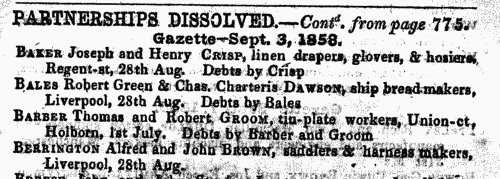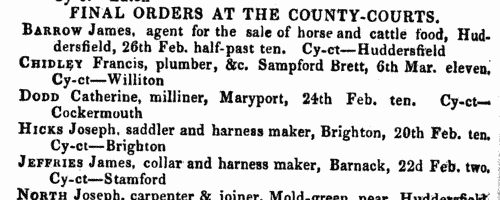Daw Surname Ancestry ResultsOur indexes 1000-1999 include entries for the spelling 'daw'. In the period you have requested, we have the following 406 records (displaying 261 to 270): Single Surname Subscription | | | Buying all 406 results of this search individually would cost £2,488.00. But you can have free access to all 406 records for a year, to view, to save and print, for £100. Save £2,388.00. More... |
These sample scans are from the original record. You will get scans of the full pages or articles where the surname you searched for has been found. Your web browser may prevent the sample windows from opening; in this case please change your browser settings to allow pop-up windows from this site. Voters in Dorchester district of Dorset
(1857)
The poll book of the county of Dorset for the general election of 3 April 1857 lists all the actual voters: the first column gives the man's number on the electoral register; then the voter's name in full (surname first); residence; qualification (C. for Copyhold, F. for Freehold, L. for Leasehold, O. for Occupier), and then 1s for the votes cast (Se for Henry Ker Seymer, F for Mr Floyer, St for Henry G Sturt, P for William H Berkley Portman).DAW. Cost: £4.00.  | Sample scan, click to enlarge

| Bankrupts
(1858)
Bankruptcy notices for England and Wales: bankruptcy often caused people to restart their lives elsewhere, so these are an important source for lost links
DAW. Cost: £6.00.  | Sample scan, click to enlarge

| Customs Officers in Plymouth
(1858)
Complete lists of serving customs officers and clerks in the Port of London and all the outports of Britain and Ireland (including the Isle of Man and the Channel Islands) were published each year in The British Tariff. This issue is corrected to 30 September 1858: the sample scan shows the entry for Hartlepool.DAW. Cost: £6.00.  | Sample scan, click to enlarge

| Dissolutions of partnerships in England and Wales
(1858)
Perry's Bankrupt and Insolvent Gazette, issued monthly, included lists of dissolutions of partnerships gazetted in England and Wales. The names of the partners are given in full, surnames in capitals, followed by trade and address, and date of the end of the partnership. Each entry usually ends with the phrase 'Debts by ...', indicating which partner intended to continue, and resume the responsibilities of, the business. This is the index to the names of the partners, from the issues from January to December 1858.DAW. Cost: £6.00.  | Sample scan, click to enlarge

| Insolvents in England and Wales
(1858)
Perry's Bankrupt and Insolvent Gazette, issued monthly, included lists of insolvencies and stages in the process whereby the insolvents petitioned for release from debtors' prison. The insolvent is generally referred to by name (surname first), address and trade. This is the index to the names of the insolvents, from the issues from January to December 1858.DAW. Cost: £6.00.  | Sample scan, click to enlarge

| Trainee Schoolmistresses at Salisbury
(1859)
The Education Department set examinations of trainee teachers at the various training colleges in Britain. This is the class list of the women who took examinations at the Teacher Training College at Christmas 1859. The names are given for the second year first, arranged by division in the examination (in order of merit for the first and second divisions), and then for the students of the first year, arranged similarly. Full names are given (with initials for middle names). The letter (D.) indicates that the candidate had obtained a certificate of competency as a teacher of drawing. An asterisk signifies that the candidate had received a prize for proficiency in drawing. The sample scan is from an Edinburgh list of trainee schoolmistresses.DAW. Cost: £6.00.  | Sample scan, click to enlarge

|  Sailors and marines on board Her Majesty's ship Centaur
(1860) Sailors and marines on board Her Majesty's ship Centaur
(1860)
The China Medal was awarded to soldiers and sailors involved in the various actions of the war against China, in which this ship was engaged from in 1860. The medals were either delivered on board or sent on in 1862: except that many of the men were no longer immediately traceable, and the remarks on the roll show that some medals were not sent on for several years, and some were never sent. After the main roll there is a section showing which of the men also qualified for clasps. Separate clasps were awarded for men who had been in receipt of the China Medal of 1842; for the taking of Fatshan in 1857, Canton in 1857, Taku Forts in 1858, Taku Forts in 1860, and Pekin in 1860. Most of the men on this ship are shown as having been given the Taku Forts 1860 clasp, for being actually present at the capture of the Taku Forts 21 August 1860.DAW. Cost: £8.00.  | Sample scan, click to enlarge

|  Sailors and marines on board Her Majesty's ship Imperieuse
(1860) Sailors and marines on board Her Majesty's ship Imperieuse
(1860)
The China Medal was awarded to soldiers and sailors involved in the various actions of the war against China, in which this ship was engaged in 1860. The medals were either delivered on board or sent on in 1862: except that many of the men were no longer immediately traceable, and the remarks on the roll show that some medals were not sent on for several years, and some were never sent. After the main roll there is a section showing which of the men also qualified for clasps. Separate clasps were awarded for men who had been in receipt of the China Medal of 1842; for the taking of Fatshan in 1857, Canton in 1857, Taku Forts in 1858, Taku Forts in 1860, and Pekin in 1860. Most of the men on this ship are shown as having been given the Taku Forts 1860 clasp, for being actually present at the capture of the Taku Forts 21 August 1860; and the Pekin clasp, for being actually present before Pekin the day the gate of that city was given up to the allied (British and French) army, viz. on 13 October 1860.DAW. Cost: £8.00.  | Sample scan, click to enlarge

| Long-stay Paupers in Workhouses: Crediton
(1861)
This comprehensive return by the Poor Law Board for England and Wales in July 1861 revealed that of the 67,800 paupers aged 16 or over, exclusive of vagrants, then in the Board's workhouses, 14,216 (6,569 men, 7,647 women) had been inmates for a continuous period of five years and upwards. The return lists all these long-stay inmates from each of the 626 workhouses that had been existence for five years and more, giving full name; the amount of time that each had been in the workhouse (years and months); the reason assigned why the pauper in each case was unable to sustain himself or herself; and whether or not the pauper had been brought up in a district or workhouse school (very few had). The commonest reasons given for this long stay in the workhouse were: old age and infirm (3,331); infirm (2,565); idiot (1,565); weak mind (1,026); imbecile (997); and illness (493). DAW. Cost: £6.00.  | Sample scan, click to enlarge

| Long-stay Paupers in Workhouses: Gloucester
(1861)
This comprehensive return by the Poor Law Board for England and Wales in July 1861 revealed that of the 67,800 paupers aged 16 or over, exclusive of vagrants, then in the Board's workhouses, 14,216 (6,569 men, 7,647 women) had been inmates for a continuous period of five years and upwards. The return lists all these long-stay inmates from each of the 626 workhouses that had been existence for five years and more, giving full name; the amount of time that each had been in the workhouse (years and months); the reason assigned why the pauper in each case was unable to sustain himself or herself; and whether or not the pauper had been brought up in a district or workhouse school (very few had). The commonest reasons given for this long stay in the workhouse were: old age and infirm (3,331); infirm (2,565); idiot (1,565); weak mind (1,026); imbecile (997); and illness (493). DAW. Cost: £6.00.  | Sample scan, click to enlarge

|
Research your ancestry, family history, genealogy and one-name study by direct access to original records and archives indexed by surname.
|













